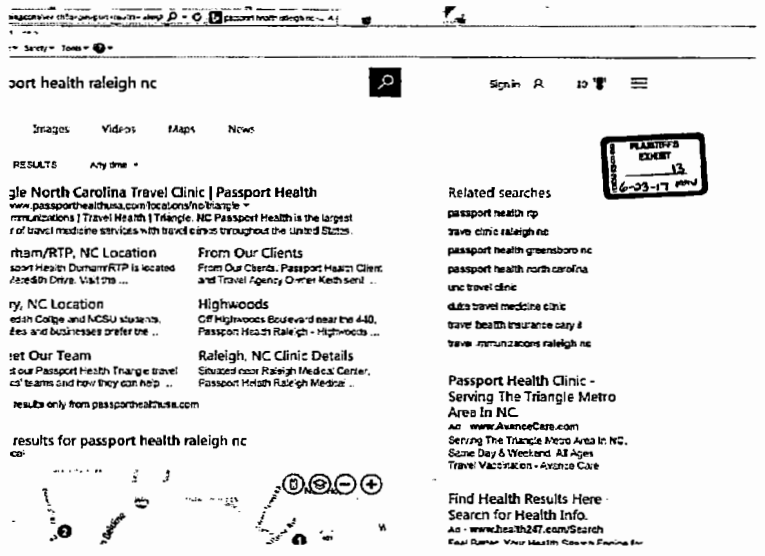Your Periodic Reminder That Keyword Ad Lawsuits Are Stupid–Passport Health v. Avance
The parties compete for the provision of health services related to traveling, like immunizations. The defendant Avance bought keyword ads triggered on the plaintiff’s trademark “Passport Health.” In 2013, the trademark owner complained, and Avance apparently dropped the Google ad buy. However, apparently everyone forget about Bing. In 2017, the trademark owner reemerged, complaining about the Bing ad buys. This lawsuit ensued.
It doesn’t go well for the trademark owner. You kind of get the sense where the judge is going from this introductory summary: “During the three-year period leading up to this lawsuit, Avance’s Bing Passport Health AdWord resulted in forty-one clicks, seven of which occurred in the month this suit was filed. It is undisputed that there is no evidence that a consumer was actually confused by the Avance’s Bing advertisement.” How in the world did this case reach summary judgment rather than settling early? Worse, three Biglaw firms (Womble, Michael Best, and Troutman Sanders), including 6 lawyers in 5 different offices, were involved in this litigation. What an expensive waste.
This screenshot shows Avance’s ad buy. See the first ad on the right. As you can see, the trademark “Passport Health” is in the first line.
The court says competitive keyword advertising is not per se infringing. Consistent with the uncited FTC v. 1-800 Contacts ruling, the court says “Passport has failed to identify any decision which has held that the mere purchase of an AdWord from a search engine constitutes trademark infringement.” (Cites to the 2007 JG Wentworth and 2004 Geico rulings). This case doesn’t disturb that uniform and unbroken line of jurisprudence.
The court then considered Avance’s inclusion of the trademark “Passport Health” in the ad copy. The trademark owner made the mockable argument “that it is entitled to judgment as a matter of law because Avance used its identical mark in the Bing advertisement, and therefore there is a presumption of a likelihood of confusion.” Wow, that’s pretty hostile to the venerable and universally accepted multi-factor test for likelihood of consumer confusion. The trademark owner also made the mockable argument that “because the phrase ‘passport health’ appears in Avance’s Bing advertisement, trademark infringement has been conclusively established.”
These positions likely explain why a case over 41 clicks didn’t settle. The trademark owner apparently took intransigent legal positions that far exceed trademark law. Not much room for settlement when the trademark owner grossly overestimates its chance of winning.
Despite the trademark owner’s optimism, the court easily concluded there’s no likelihood of consumer confusion. Citing the Network Automation ruling, the court says “A search engine’s segregation of the search results on the page so that advertisements appear in separately labeled sections, in smaller or different font, or with shading lessens the likelihood that consumers will be confused.” I guess Bing’s implementation passed muster, even though the screenshot above shows no shading or lines to demarcate the ads. The court concludes:
Avance has proffered evidence that the Bing advertisement was clicked 1.4 times per month for the three years which preceded this case, and that only .012% of visits to Avance Care’s website during a twenty-six month period came from the Bing advertisement. See George & Co., 575 F.3d at 398 (4th Cir. 2009) (“[e]vidence of only a small number of instances of actual confusion may be dismissed as de minimis.”). It is undisputed that Bing’s share of the search engine market is minimal as compared to Google’s, and there is simply no evidence that any consumers clicked on the Avance Care ad and were confused.
If a competitive keyword ad falls in Bing’s forest and no one is around to hear it, is it trademark infringement?
As a bonus insult, the court denigrates the strength of the “Passport Health” trademark, saying it’s a “conceptually weak” mark. Yes, the trademark owner paid substantial money fighting 41 clicks, only to walk out of court with its key trademark asset besmirched.
Two obvious Qs:
- given the ease of this win and Passport Health’s mountain-out-of-molehill position, I wonder if the court will award Avance its attorneys’ fees under the Lanham Act fee-shifting provision for “exceptional” cases?
- why wasn’t it satisfactory for the trademark owner to avail itself of Bing’s IP policy, which (like Google) lets trademark owners block references to the trademark in the ad copy? That seems like it would have solved much of the trademark owner’s issue.
You already knew this, but let me remind you: if you’re suing over competitive keyword ads….
Case citation: Passport Health, LCC v. Avance Health System, Inc., 2018 WL 6620914 (E.D.N.C. Dec. 18, 2018)
More Posts About Keyword Advertising
* Restricting Competitive Keyword Ads Is Anti-Competitive–FTC v. 1-800 Contacts
* Another Failed Trademark Suit Over Competitive Keyword Advertising–JIVE v. Wine Racks America
* Negative Keywords Help Defeat Preliminary Injunction–DealDash v. ContextLogic
* The Florida Bar and Competitive Keyword Advertising: A Tragicomedy (in 3 Parts)
* Another Court Says Competitive Keyword Advertising Doesn’t Cause Confusion
* Competitive Keyword Advertising Doesn’t Show Bad Intent–ONEpul v. BagSpot
* Brief Roundup of Three Keyword Advertising Lawsuit Developments
* Interesting Tidbits From FTC’s Antitrust Win Against 1-800 Contacts’ Keyword Ad Restrictions
* 1-800 Contacts Charges Higher Prices Than Its Online Competitors, But They Are OK With That–FTC v. 1-800 Contacts
* FTC Explains Why It Thinks 1-800 Contacts’ Keyword Ad Settlements Were Anti-Competitive–FTC v. 1-800 Contacts
* Amazon Defeats Lawsuit Over Its Keyword Ad Purchases–Lasoff v. Amazon
* More Evidence Why Keyword Advertising Litigation Is Waning
* Court Dumps Crappy Trademark & Keyword Ad Case–ONEPul v. BagSpot
* AdWords Buys Using Geographic Terms Support Personal Jurisdiction–Rilley v. MoneyMutual
* FTC Sues 1-800 Contacts For Restricting Competitive Keyword Advertising
* Competitive Keyword Advertising Lawsuit Will Go To A Jury–Edible Arrangements v. Provide Commerce
* Texas Ethics Opinion Approves Competitive Keyword Ads By Lawyers
* Court Beats Down Another Competitive Keyword Advertising Lawsuit–Beast Sports v. BPI
* Another Murky Opinion on Lawyers Buying Keyword Ads on Other Lawyers’ Names–In re Naert
* Keyword Ad Lawsuit Isn’t Covered By California’s Anti-SLAPP Law
* Confusion From Competitive Keyword Advertising? Fuhgeddaboudit
* Competitive Keyword Advertising Permitted As Nominative Use–ElitePay Global v. CardPaymentOptions
* Google And Yahoo Defeat Last Remaining Lawsuit Over Competitive Keyword Advertising
* Mixed Ruling in Competitive Keyword Advertising Case–Goldline v. Regal
* Another Competitive Keyword Advertising Lawsuit Fails–Infogroup v. DatabaseLLC
* Damages from Competitive Keyword Advertising Are “Vanishingly Small”
* More Defendants Win Keyword Advertising Lawsuits
* Another Keyword Advertising Lawsuit Fails Badly
* Duplicitous Competitive Keyword Advertising Lawsuits–Fareportal v. LBF (& Vice-Versa)
* Trademark Owners Just Can’t Win Keyword Advertising Cases–EarthCam v. OxBlue
* Want To Know Amazon’s Confidential Settlement Terms For A Keyword Advertising Lawsuit? Merry Christmas!
* Florida Allows Competitive Keyword Advertising By Lawyers
* Another Keyword Advertising Lawsuit Unceremoniously Dismissed–Infostream v. Avid
* Another Keyword Advertising Lawsuit Fails–Allied Interstate v. Kimmel & Silverman
* More Evidence That Competitive Keyword Advertising Benefits Trademark Owners
* Suing Over Keyword Advertising Is A Bad Business Decision For Trademark Owners
* Florida Proposes to Ban Competitive Keyword Advertising by Lawyers
* More Confirmation That Google Has Won the AdWords Trademark Battles Worldwide
* Google’s Search Suggestions Don’t Violate Wisconsin Publicity Rights Law
* Amazon’s Merchandising of Its Search Results Doesn’t Violate Trademark Law
* Buying Keyword Ads on People’s Names Doesn’t Violate Their Publicity Rights
* With Its Australian Court Victory, Google Moves Closer to Legitimizing Keyword Advertising Globally
* Yet Another Ruling That Competitive Keyword Ad Lawsuits Are Stupid–Louisiana Pacific v. James Hardie
* Another Google AdWords Advertiser Defeats Trademark Infringement Lawsuit
* With Rosetta Stone Settlement, Google Gets Closer to Legitimizing Billions of AdWords Revenue
* Google Defeats Trademark Challenge to Its AdWords Service
* Newly Released Consumer Survey Indicates that Legal Concerns About Competitive Keyword Advertising Are Overblown



Pingback: The Ongoing Saga of the Florida Bar's Angst About Competitive Keyword Advertising - Technology & Marketing Law Blog()